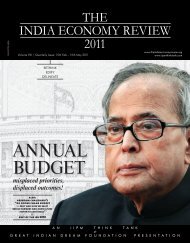Download - The India Economy Review
Download - The India Economy Review
Download - The India Economy Review
Create successful ePaper yourself
Turn your PDF publications into a flip-book with our unique Google optimized e-Paper software.
can be fi xed for decades, in some cases for<br />
up to 30 years and provisions are there for<br />
further extension too. Circumstances can<br />
change dramatically over such a time-<br />
frame. Yet, the terms by which govern-<br />
ments have to purchase power from IPPs<br />
remain infl exible. Governments are tied<br />
into buying the same amount of power,<br />
regardless of fl uctuations in demand or<br />
alternative sources of supply. Prices are<br />
fi xed in foreign exchange, regardless of<br />
how this might relate to domestic prices<br />
or to what utilities are able to charge<br />
customers. Once PPAs have been signed,<br />
it can be diffi cult to change the terms, not<br />
least because of the fear that future inves-<br />
tors will be put off by a government that<br />
is seen to renege on agreements. 39<br />
IPPs are supposed to speed up the<br />
project process compared with other<br />
government contracts but this has not<br />
been the case. Once up and running, IPPs<br />
continue to stifl e competition. According<br />
to a World Bank study, “PPAs can hamper<br />
effi ciency in system operations and sector<br />
liberalisation. Even if all the output can be<br />
freely dispatched, PPA prices deviate from<br />
those provided by a competitive pool –<br />
prices that are the same for all generators,<br />
a capacity charge smaller than that of a<br />
base load IPP and time-varying energy<br />
charges. <strong>The</strong> potential for ineffi ciencies is<br />
substantial if the IPPs meet a large share of<br />
the load; for example, PPA prices provide<br />
no incentive to maximize the availability of<br />
base load IPPs in the period when supply<br />
costs are highest.” 40 This implies that the<br />
higher the proportion of power comes<br />
from IPPs, the greater the scope for ineffi<br />
ciencies. Based on this logic the lower<br />
the proportion of IPPs in power generation<br />
would increase effi cient the electricity<br />
sector.<br />
Investors have no incentive to respond<br />
to market conditions or to compete with<br />
other producers. <strong>The</strong> only competition<br />
comes in the contract negotiating stage<br />
(and not always then). This is in itself a<br />
disincentive for new investors as, even<br />
if they can produce power more cheaply,<br />
the electricity utility is unable to switch<br />
to alternative sources for the duration of<br />
the PPA. Governments get left with<br />
‘stranded assets’ which means that they<br />
are committed to paying higher prices for<br />
electricity (or compensation to the IPP),<br />
even if a cheaper competitor comes on to<br />
the market which might be due to technological<br />
progress and access to cheap<br />
power inputs. 41<br />
By insulating companies from some<br />
aspects of commercial risk, the IPP<br />
framework sets an environment in the<br />
private sector, which the whole privatisation<br />
process seeks to eradicate from<br />
public ownership. One of the reasons put<br />
forward for privatisation is that government<br />
bureaucracies can suffer from<br />
‘moral hazard’. This is the ineffi ciency<br />
that arises from economic actors being<br />
insulated from the real risks of their actions.<br />
In the private sector, where profi ts<br />
are at stake, the argument is that managers<br />
will use resources more effi ciently. In<br />
the case of IPPs, however, where PPAs<br />
are fi xed for long periods, another kind of<br />
moral hazard arises. Managers have no<br />
incentive to respond to market changes<br />
or to improve technological practices.<br />
<strong>The</strong> only incentive is to keep profi ts up<br />
and so keep costs down. IPPs are capital<br />
intensive and the most fl exible cost is la-<br />
R ESOURCE PLANNING<br />
bour. Hence, the main ‘effi ciency gains’<br />
one could expect from an IPP over a period<br />
of time is downward pressure on<br />
wages and numbers employed. 42<br />
Gujarat State Electricity Board (GSEB)<br />
is a classical example to this where it is to<br />
pay around Rs. 500 crore to three independent<br />
power projects including Essar<br />
Power, Gujarat Torrent Electricity Company<br />
(GTEC) and Gujarat Industrial<br />
Power Company (GIPCL). However,<br />
GSEB will not buy power from them because<br />
of the fuel that they use (high cost<br />
naphtha). GSEB has to continue with<br />
payment because it is committed to<br />
paying a fi xed cost of these power projects<br />
as per the power purchase agreements<br />
signed between GEB and the three<br />
In the case of IPPs, however, where<br />
PPAs are fi xed for long periods,<br />
another kind of moral hazard arises<br />
companies. 43<br />
High Prices and Generous Concessions44<br />
IPPs are an expensive source of power<br />
generation. According to the World Bank<br />
study, “in the fi nal analysis, it appears that<br />
IPPs have often infl ated supply prices for<br />
utilities”. 45 Prices paid under PPA terms<br />
are often so high relative to sales tariffs<br />
that they leave no margin for the costs of<br />
transmission. Raising prices for the end<br />
user is not always a solution as higher<br />
prices may just result in less usage or efforts<br />
to avoid charges. 46<br />
<strong>The</strong> reasons for high PPA prices and<br />
generous concessions stem from the<br />
terms negotiated between the IPP and the<br />
government when the contract is drawn<br />
up. Subsequent events may further infl ate<br />
costs but to a large extent the problems<br />
THE INDIA ECONOMY REVIEW<br />
153





